Text

art block :p
#honkai star rail#hsr#hsr fanart#fanart#aventurine#hsr aventurine#aventurine fanart#artwork#drawing#digital art#my art#hoyoverse#kakavasha
50 notes
·
View notes
Text
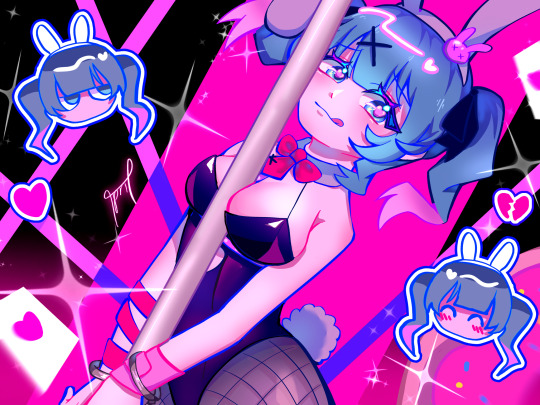
🐰🕳️🩷
11 notes
·
View notes
Text
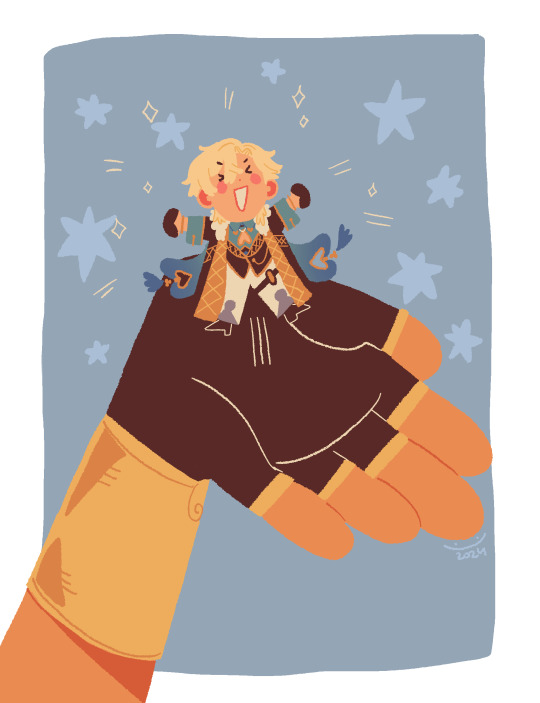
life is dark and miserable but tiny aventurine makes it all disappear
would be so sexy and cool if y'all could reblog my art^^
1K notes
·
View notes
Text
On Haruka’s name meaning and how it relates to his character arc
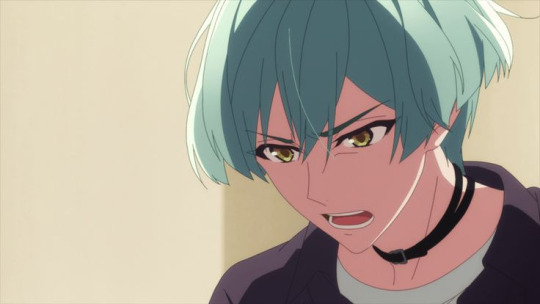
In Japanese fictional media, characters’ names often carry deep and layered meanings, mostly due to how easy it is to subtly employ this storytelling device with Japanese names being composed of kanji characters with their own meanings. Idolish Seven is no stranger to this practice–from the more overt numerical themes and the Takanashi vs. Takamasa symbolism, to the subtler, more veiled meanings to them (like how Ten and Aya’s names relate to their position with regards to being groomed to overcome Zero–brief explanation here), these names can offer profound insights into the characters. In this opportunity specifically, we’re going to talk about Haruka’s name's meaning and its relation to his development in Part 3 to 4 in particular, because there’s a hidden foreshadowing that often goes unnoticed by most people.
As this will be spoiling a lot of Main Story Part 3-4 and Antagonistic Quarter, the rest will be kept under the cut!
Before we get into the main point, it’s important to first find out what Haruka’s name means by breaking it down:
亥 (i): boar, as in the Japanese zodiac sign. This simply fits ŹOOĻ’s theme of carnivorous animals belonging to the Japanese zodiac.
清 (sumi): a character relating to pure/clear, e.g., the verb 清む (read “sumu”, which is another form of 澄む) means “to become pure/clear”.
悠 (haruka): the simple translation is “calm/composed”, yet there’s a depth that lies in the kanji construction: 悠 combines 攸, representing the act of pouring water on one's back in the purification ritual known as misogi (禊ぎ), with 心, which means heart. The philosophy embedded in 悠 as a name is achieving composure after undergoing purification of body and soul (interestingly, the site that I use as a reference for this describes the meaning as 心身共に清められている–notice how the verb used there has the character 清 that appears in his surname?)
At first glance, it may appear ironic that a character predominantly defined by his anger is given a name that signifies the exact opposite. One might be tempted to believe that this naming choice was solely made for the sake of creating a striking contrast between his name and his actual personality. However, as you follow his character arc, you’ll find out that this name–seemingly contradictory at first–actually hints at his journey more than you may have initially thought!
The central theme to ŹOOĻ’s arc is learning to not let your past wounds consume you to the point of letting them dictate your actions. This theme is particularly evident in Haruka’s character, in which his anger and bitterness seem more pronounced compared to the rest of ŹOOĻ. It’s understandable how this is the case for Haruka though–not only is he already the youngest in ŹOOĻ, which might have made it harder for him to process his emotions more maturely (though I have to admit, for someone his age, he actually copes pretty well), it turns out that he also experienced his trauma at a very tender age.

I’ll definitely make you regret it!!
The thing is, Haruka hasn’t always been motivated by anger prior to experiencing his trauma–both Antagonistic Quarter and his 2022 birthday card shows how he mainly did things for the happiness of others back then. It wasn’t until a certain event in the later part of Antagonistic Quarter–where Kujou discarded Haruka in favor of Ten–that Haruka started turning for the worse. While it was mostly Kujou’s fault for not “correctly” raising Haruka as an idol, Kujou was also concerned about the fact that Haruka started treating him as a stand-in for the fans, leading to him deeming Haruka a failure and abandoning him. This of course shattered Haruka, who blindly trusted Kujou’s judgment and just listened to everything Kujou told him without further questioning anything in a desperate attempt to get Kujou to acknowledge and adopt him. Following the call about his grandmother's hospitalization right after that, Haruka ended up experiencing overwhelming stress that led to his breakdown. After internally articulating his thoughts about how tired he was of being good if it only brought him misfortune, he swore out loud to make Kujou regret. This scene right here represents the “corruption” of his motivations.
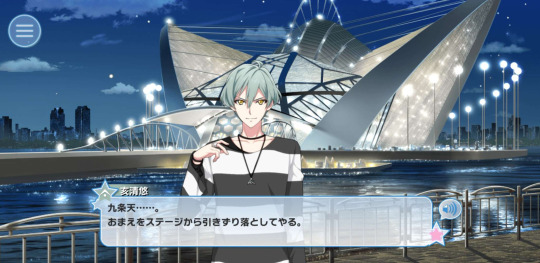
Kujou Ten… I’ll drag you off the stage and make you fall.
In Part 3, after being unhealthily enabled and manipulated by Ryou, Haruka spends most of his time on screen obsessing about Ten and taunting him when he actually meets the person in question. While Haruka's anger toward Kujou is very much justified given Kujou’s unfair treatment to him, it’s important to note that it’s also awfully misdirected at Ten. As much as Ten was (part of) the cause of Haruka’s abandonment, he wasn't actually directly involved in it, especially seeing that Ten knew nothing of this at all prior to meeting Haruka. The one actually responsible for the decision was Kujou alone, so it’s unfair of Haruka himself to target Ten for revenge. However, it’s very likely that Haruka finds it easier to lash out at Ten, the object of his jealousy, rather than directly confronting Kujou, whom he probably still harbors complicated feelings for. At this point of time, he lacks any emotional connection whatsoever with Ten, so he uses him as a proxy for Kujou in his revenge scheme (that, and I don’t think Haruka can think of another means to get his revenge on Kujou aside from taking it out on Ten).
Surprisingly to Haruka, Ten doesn’t succumb to the harm Haruka inflicted on him the way Haruka expects him to. And this also frustrates him greatly, because in a way, Haruka was projecting heavily on Ten–so if his wounds hurt him so much, then why do they seem to not bother Ten even a bit? How can Ten remain resilient while he struggles even to lift himself from the ground he’s fallen on? On the other hand, though, I think this is also a key to Haruka realizing how being motivated primarily by his hatred isn’t going to get him anywhere.
That said, realizing that Ten's downfall won't ease his anger still isn’t enough. You see, Haruka’s trauma revolves around his actions going unappreciated by the people around him, which then becomes the roots of his fear of rejection. While he doesn’t necessarily expect everything he does to be reciprocated, it can feel crushing to do something for someone else’s shake only for them to not notice it or–even worse–outright reject it. From Ryou caring more about Riku when Haruka is the one singing for him, to Minami being dismissive to Haruka reaching out to help him (though in defense of Minami, it also involves a trauma of his that he isn’t ready to face and process yet), it’s as if all he ever did would just amount to nothing. During a live performance in Part 4 Chapter 5, he even vocalized this in a monologue:
オレの言葉を、気持ちを大事にして。 簡単に、突き返さないで。 そうすれば…..。 そうすれば…..。その先は、今更、もう、馬鹿らしくて言えないや。 Please take my words, my feelings, seriously. Don’t easily brush them off. If you do it... Because if you do it... after that, at this point, it just feels too silly to say anything anymore.
Like seen above, a couple of times in the story, Haruka is so close to just choosing to not care anymore, even though it proves to be harder to do for him because it actually goes against his nature to want to help others (again, it used to be his main reason to do almost anything when he was younger). But then enters Touma to the picture–the one ŹOOĻ member who, despite facing rejection from almost every direction, refuses to give up on the rest of ŹOOĻ and continues to believe in them, including Haruka. Personally, I think the one moment that especially cements Touma as the catalyst that helps kickstart Haruka’s development is their conversation at the butler cafe in Part 3 Chapter 16. By asking Haruka what he wants to do in the future beyond his revenge, Touma actually prompts Haruka to reevaluate the foundation of his actions for the first time.

I think you’re a very amazing person. That if it’s with you, then I can do it… I want to keep singing with you, together, you know.
However, arguably the biggest catalyst that finally puts Haruka’s growth in motion comes in Part 4 Chapter 5 when Haruka breaks out in tears after a messy fight with ŹOOĻ and Ryou. At this very moment, in an attempt to console Haruka, Touma finally says the words that Haruka has so wanted to hear for a long time (with the utmost sincerity–very unlike Ryou): that he’s better than Kujou Ten, that Haruka is the one he wants to sing together with. This holds immense significance for Haruka–he has consistently felt unwanted by everyone up until now, so hearing that he’s no longer just an afterthought to someone else is pivotal to his journey towards healing from his trauma.
We encounter ŹOOĻ again in Part 4 Chapter 7 during an interview, where Touma reaches a breaking point due to Minami and Torao’s uncooperative behavior, prompting him to vent his frustrations about their attitudes. Interestingly, this marks the first time the usually hot-tempered Haruka remains visibly composed, which in a way is also ironic since it's also a moment where the typically collected Minami and Torao (and to a lesser extent, Touma as well) behave somewhat immaturely, contrasting with their usual demeanor, despite being older than Haruka.
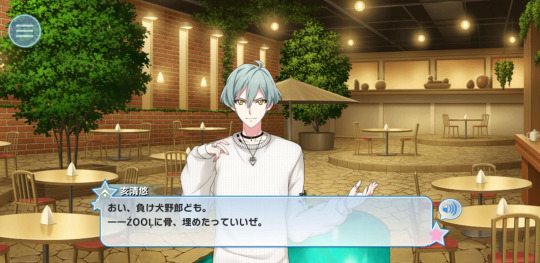
Hey, you bunch of losers. We’re okay with even committing our whole lives to ŹOOĻ.
Haruka only speaks up when he sees Touma realizing that he’s essentially been ranting during a formal interview (in which Haruka also playfully berates Touma for not ending his “cool talk” properly). It’s in this moment that Haruka reveals his newfound resolve, one no longer rooted in hatred or anger, that is, to dedicate his entire life for ŹOOĻ. There’s more to his words in particular, though: as displayed in the screenshot above, Haruka uses the idiomatic expression ~に骨を埋める, which literally translates to “to bury one’s bones in (something).” The idea behind this is that you commit yourself so much to said thing that you actually die while still engaging with it. While Haruka partially does this to echo Touma (since Touma did use the same expression to almost literally beg Minami and Torao to be cooperative with him), it’s also important that Haruka specifically decides to echo this of all the stuff that Touma said and end his speech with it in particular. Essentially, ŹOOĻ has become Haruka’s newfound purpose for existence as he now realizes that these members are the people who most need him and are worth fighting for, signifying a “purification” of his motivation. This transformation finally enables genuine growth and paves the way for his redemption later on.
Before we end this writeup, there’s another thing I want to specifically bring up: while Haruka finally learns to not let his negative emotions take control of his actions, he doesn’t just completely discard them. In fact, he instead acknowledges them, because he has to allow himself to confront and process his feelings rather than denying them to be able to grow from them. This, I think, is expressed beautifully in the lyrics of his solo song, Labyrinth:
黒い気持ちと手を繋いだって構わない 抱きしめたっていい I don’t mind holding hands with dark feelings I'm fine with even embracing them
The path was undoubtedly challenging and sometimes very painful even, but in the end, Haruka was able to discover a “pure” intent and not let his negative emotions completely shape him as a person, befitting of his name.
30 notes
·
View notes
Text
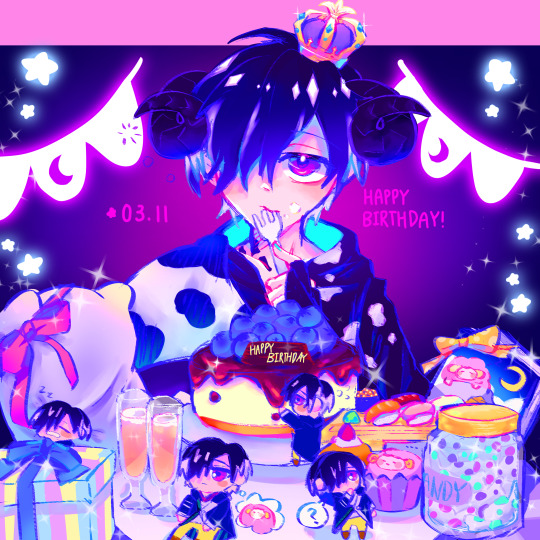
happy birthday my lovely source of suffering
#obey me#obmswd#obm mc#obmnb#obm belphegor#obey me belphegor#obey me belphie#belphegor x reader#belphegor x y/n#belphegor#obey me fanart#obm fanart
91 notes
·
View notes
Text

my blonde beautiful gambling addiction princess
51 notes
·
View notes